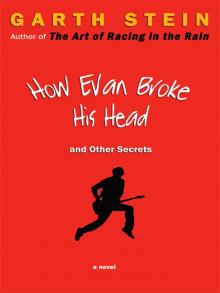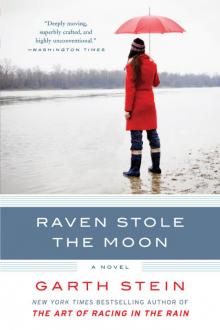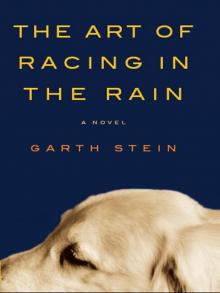- Home
- Garth Stein
A Sudden Light Page 4
A Sudden Light Read online
Page 4
Serena stood up and grabbed a box of matches from the counter next to the big, old-fashioned stove. She dropped the box on the table before me and then resumed her seat.
“There are all sorts of hiding places in this house,” she said. “When Riddell House was built there were many things to be afraid of. Not Indians, of course. The Northwest Coast natives were a docile lot, happily trading with each other and white men alike. But there were bandits and thieves who targeted the very rich; they would kidnap and ransom family members when they could. At least that’s what Elijah believed, though he was a noted misanthrope, so grains of salt should be taken as necessary. Nevertheless, this house was designed with secret passages and places to hide so Elijah could feel safe—they call them priest holes, a term held over from the Reformation in England, when Catholics would hide their priests from the Protestant establishment. Do you know what they did when they discovered a priest hiding in the walls during the Reformation?”
“What did they do?”
“They hanged him, or they burned him alive. A good hanging has its drama, but there’s nothing like the scent of burning flesh lingering in the air to roust a priest or two from his hidey-hole. I’m sure you can imagine.”
“Serena,” my father scolded.
“There’s a secret stairway in Riddell House,” Serena continued without a pause. “I don’t know where. It’s a secret, isn’t it, Jones? A secret you shared with Mother? I was too young to be allowed in on the secret. There’s a hidden stairway, Trevor, and if you find it and strike a match, you will see an apparition in the sudden flash of light. The ghost of Riddell House. But we shouldn’t talk about this; it upsets Daddy. Daddy finds talk of spirits very disturbing. You remember the night Daddy took the ax to the stairs, don’t you, Brother Jones?”
“I shouldn’t have come here,” he mumbled, exasperated.
“Perhaps not,” Serena agreed. “And yet you’re here. You came here with some amount of deliberation. You didn’t fall through the floorboards and find yourself at Riddell House. You got on a plane. You checked luggage. You rented a car . . . Daddy, please put your chicken back on your plate and eat it. Eat all of it, tendons included, or else you will weaken, fall, and break your hip. And studies show that once mobility is diminished by a broken hip, life expectancy is greatly decreased.”
“I don’t like chicken!” Grandpa bellowed. “I don’t like chicken! I don’t like chicken! I don’t like chicken!”
Serena calmly put down her knife and fork.
“This is a very important dinner,” she said. “Brother Jones has returned, and he’s brought his son along with him. If you cannot be civil, you will excuse yourself.”
She didn’t say it harshly, but she said it with undeniable clarity.
“I don’t like chicken,” Grandpa Samuel repeated meekly one last time.
“Then eat vegetables instead. Take some corn, some salad, and some peas.”
Grandpa Samuel surveyed the food on the table, his focus darting from bowl to bowl. He seemed overwhelmed by the task set for him.
“May I be excused?” he asked.
“You haven’t said a word to Jones.”
He worked his jaw and nervously rubbed the stumps of his missing fingers. “At night,” he said to me with a whiff of conspiracy, “if you listen carefully, you can hear her dancing.”
“That’ll be enough of that, Daddy,” Serena said sharply. “You know what it does to your blood pressure.”
“You can hear footsteps,” Grandpa Samuel whispered.
“Daddy!”
He stopped. Serena glared at him, and he didn’t dare speak.
“You can hear who dancing?” my father asked pointedly.
Grandpa Samuel glanced at Serena; he looked down at his plate.
“It’s the rain,” he said. “You can hear the rain.”
“Who can you hear dancing?” my father demanded.
Grandpa Samuel didn’t reply. My father looked to Serena, but she ignored him.
“You can read it to him, if you can’t remember,” Serena said to Grandpa Samuel after a moment. “Read what you’ve written. You worked on it so hard.”
My grandfather seemed confused; my father, frustrated.
“In your pocket,” Serena suggested.
Grandpa Samuel felt his pants pocket. He produced a slip of paper and grew calm. He read the paper to himself. Then he looked at my father.
“I’ve missed you,” he said. He glanced at the paper again. “I regret that it’s been so long. I’m happy to see you and to meet Trevor.”
He looked down at his paper, and tears filled his eyes but did not overflow.
“Read all of it,” Serena said.
“I hope that you can forgive me for my transgressions,” Grandpa Samuel read. He quickly folded the paper, returned it to his pocket, and swiped at his eyes with the back of his hand. “My transgressions,” he repeated. “It means things I’ve done wrong.”
My father scowled. “Is this for real?” he asked Serena.
“Of course it is.”
“May I go to my barn now?” Grandpa Samuel asked. “I’d like to go to my barn.”
“You may,” Serena replied. “But don’t stay late. And turn on the lights so you don’t hurt your eyes. Sometimes he forgets to turn on the lights and I find him working in the dark!”
Grandpa Samuel nodded and shuffled out the back door of the kitchen.
“What the hell was that?” my father demanded after Grandpa Samuel had gone.
Serena sighed heavily and got up from the table.
“I’m so sorry,” she said, obviously disappointed. “He knows exactly which buttons to push with me. I shouldn’t have reacted. I’d hoped our reunion dinner would have been more pleasant.”
She gestured to the myriad plates and dishes of food spread across the table.
“A written apology?” my father asked.
“He wanted to apologize to you. He asked me to help him with it. I don’t think you fully comprehend the extent of his condition. It’s not easy living with him.”
She closed her eyes, took a deep breath, and exhaled, swinging her arms in an arc over her head, like a dancer or a yoga instructor.
“Do you like pie?” she asked me with forced cheer. “I have a blackberry cobbler for dessert.”
“Yes, please.”
“Of course, a cobbler isn’t technically a pie,” she said, removing a pie tin from the oven and setting it on the counter. “But my cobbler has a biscuit topping I think you’ll like. These are last year’s berries; it’s too early for this year. Tomorrow, I’ll show you where they grow and you can keep an eye on them for me. Once they ripen, we have to move quickly or else the birds will get them. Would you like some pie, Brother Jones?”
“No, thanks.”
Serena cut a large piece of the cobbler and set it down in front of me. I took a bite and it was crazy good; the filling was bubbling and syrupy and almost too hot.
“Would you like coffee, Jones? More lemonade?”
“Do you have anything harder than lemonade?” he asked darkly.
Serena laughed, opened the lower door of a cabinet, and produced a bottle of brown liquid with a white label. She placed it on the table in front of him, her hand gripping the neck firmly.
“Is this hard enough for you, Brother Jones?”
I snickered at the innuendo. He took the bottle and examined the label; it was Jim Beam.
“It’ll do, Sister Serena. It’ll do.”
Serena took two glasses from the cupboard, and my father poured brown liquid into them while I ate my cobbler and tried not to be noticed. For a moment, Serena and my father sat across from each other, sipping their shots of whiskey and not speaking, and I realized there was a whole world they shared that I had no idea about. None at all.
“I don’t like you staring at me,” my father said.
“I’m relearning you,” Serena replied. “I’ve realized the memories, the images we ke
ep in our heads, aren’t really images at all. They’re much more vague. When I think of you, I don’t think of your face, I think of your shape. You’re faceless in my memory. You move through my memories and I know it’s you, but what I picture is without detail.”
He shrugged in response.
“If I were a painter,” Serena continued, “I would paint people without faces. Or with eyebrows only. Eyebrows and hair and chins. Because that’s what we remember. The points. But now that I see you again, I can fill in those details.”
“That’s an elaborate metaphor,” my father said. “Trevor, you should write that down. Clearly, your aunt is the writer you aspire to be.”
“Woe be the family of a writer,” Serena said. “They will forever bleed in his stories. Isn’t that right, Brother Jones?”
“Why do you call him Brother Jones?” I asked.
“It’s an artifact from our childhood,” Serena said with a chuckle. “It’s something we call each other.”
“Why?”
“Why?” she echoed wistfully. “Why does the cock crow? Don’t ask him; he doesn’t know.”
Silence again, then Serena said, “I will return for you.”
My father didn’t acknowledge the comment, so I felt I had to. “What does that mean?” I asked.
“It’s what your father said when he left. I was eleven years old. Mother had died and Jones was going away. He hugged me tightly in his big, strong, holding arms, and he said: ‘I will return for you, Sister Serena. I will return.’ It was poetic; ripped from the pages of a novel. Maybe your memoir, Young Trevor. I will return for you, Sister Serena. I’ve been waiting, and he hasn’t returned. Until now.”
“Life is complicated,” my father said after an uncomfortable pause.
“So I’ve heard,” she said. “And yet some things are not so complex as they initially seem. The fate of this house, for instance.”
Again, my father was silent, but he was thinking about something; I could tell.
“What about the fate of this house?” I asked.
“It is both simple and complex at the same time,” Serena said. “The goal, of course, is to achieve simplicity; the method may be circuitous.”
“Maybe we should table this conversation for the moment,” my father said. “I’m not sure Trevor is interested.”
“He should be,” Serena said. “Trevor, are you interested in your family’s legacy? Or would you prefer to turn a deaf ear and leave your fate in the hands of those who may or may not have your best interest in mind?”
“I’m interested,” I said.
“You see?” Serena said to my father. “And, anyway, I believe in full disclosure. He’s one of the family. I don’t think secrets should be kept from children under the pretense it is for their own good. It isn’t for their own good; it is for the convenience of the secret keepers. But I suppose that’s my own little pet peeve. What do you know already, my nephew?”
“I know we’re here because we’re broke,” I said. “And I know we’re here to sell the land. That’s all I know.”
“It’s a start,” she said. “I’ll tell you the rest as briefly as I can. Elijah, your great-great-grandfather, had two sons, Benjamin and Abraham. Benjamin, tragically, died quite young with no children, leaving Abraham as Elijah’s sole heir. When Elijah died, he put this house and property and what was left of his money into a trust for the benefit of Abraham; Abraham could use the house, but it wasn’t his. You see, Elijah didn’t want Abraham getting control of the property because Abraham wanted to sell it and develop it. Elijah had a vision that when the Riddell family has faded from the earth, this place would be returned to wild and untamed wilderness. He wanted The North Estate to be turned into a park.”
“That’s weird. Why?”
“He felt it was his moral duty to give back to the earth for all he had taken from it, even if it were but a small, symbolic gesture. Still, laws are laws, and the law of the land is that one can’t set up a trust that lasts forever. There’s a legal reason for it, called the rule against perpetuities. It’s meant to prevent dynasties. Americans hate kings and we hate dynasties. Elijah could stop Abraham from developing the land, but he couldn’t stop future heirs from doing what they wanted.”
“How do you know all this?” I asked.
“My grandfather Abraham was obsessed with it and made your father and me learn about it. Grandpa Abe wanted more than anything else to develop this land for profit, and Elijah stymied him. Elijah hoped that some future Riddell would uphold his final wish and let this land lie fallow for eternity rather than exploit it. When Grandpa Abe died, the trust was dissolved and the property and holdings were disseminated to Grandpa Samuel to do as he pleased. Thus far, Daddy has adhered to Elijah’s final wish and refused to sell the house and land. Since his mental health is rapidly declining—as you can clearly see—it’s time to move him into an assisted living facility that can properly care for him. But he won’t go because he believes Mother is dancing for him in the ballroom—”
“Wait,” my father interrupted. “That’s who he hears? He hears Mom?”
“No, no, of course not. Mother died a long time ago. He hears the rain on the roof or the mice in the walls. In his dementia, he has conjured the ghost of Mother. It’s all in his mind.”
My father frowned at her, and she turned her attention back to me.
“It’s time for your father and me to take charge of the house and grounds and develop the property so we have the financial wherewithal to care for your grandfather long term, should that be needed. Naturally, as developers, your father and I would also benefit from this transaction.”
“Oh,” I said, understanding the scheme. “That’s why we’re here.”
Serena shrugged obviously.
“Do you know how much this land is worth?” my father blurted. “Millions. Millions upon millions if the subdivision is developed properly. I can’t walk away from that. I’ll be able to provide for my family, which I haven’t been able to do of late, if you haven’t noticed our current living situation.”
I knew what that meant. It meant he believed my mother would take him back if he had money. I believed it, too. He didn’t have to be rich, he just needed enough to buy our house back. Then my mother would love him again. She loved that house, and I did, too. We probably couldn’t get our old house back, but we could get one like it.
“You should do it, then,” I said to my father. “Do whatever it is that will make Mom love you again. You shaved; that’s a good start.”
Serena laughed; she leaned over and refilled my father’s glass.
“Of course there is the minor obstacle of getting Daddy to grant us power of attorney so we can do what needs to be done,” Serena said. “That’s your father’s job.”
“Why don’t you do it?” I asked her.
“Because I’m the one who stayed behind,” she said, smiling at me curiously, as if the answer were obvious to everyone.
She raised her eyebrows, finished what little was left in her glass, and stood up.
“There’s a tradition in this house, Trevor,” she said. “The one who cooks doesn’t clean. Your father started the tradition when Mother first became ill. Before that, she did all the cleaning. Well, before that, we had servants, didn’t we, Brother Jones? Before Grandpa Abe died and the entire Riddell Empire was dismantled. Remember those days?”
“You had servants?”
“Oh, yes,” Serena said. “We had a driver to take us to school in a big black car. And we had a cook and a housekeeper, and there were men who tended the orchard. That was a time, wasn’t it, Jones?”
“Is that where our millions of dollars went?”
“No,” Serena said, laughing. “Our millions were gone before that. Elijah gave most of his fortune away before he died. Everything except this house. The cynic in me thinks he was trying to buy safe passage for his soul to the afterworld, but I may be unfairly extrapolating. It’s an interesting story; mayb
e one day your father will tell it to you. And then Grandpa Abraham lost his inheritance because some people are losers, and, no matter how they fight it, they will always lose. Your father and I have nothing unless we can sell this house. I ask you, Trevor, where is the justice? Well, no matter. Justice has arrived in the form of Brother Jones, who will fix all things, won’t you, dear brother? Oh—”
She went to the telephone table and picked up a thick, blue three-ring binder, which she set down in front of my father.
“Here’s some reading material for you, Brother Jones, should you suffer from any insomnia après voyage. It’s fascinating stuff, and I’m sure you will find it quite compelling. Good night, gentlemen. If you need something, you can find me in the servants’ wing, down this hall. Otherwise, I assume you will make yourselves at home.”
“Why do you sleep in the servants’ wing?” I asked her.
“The inquisitive mind always has another question,” she remarked patiently. “It’s nice here in the main house now, because it’s summer. But it can be so drafty and leaky during the rainy season, which runs from October until June. Daddy and I stay in the servants’ wing because it’s more comfortable and easier to manage. Anyway, I was able to take today off from work, but tomorrow is a workday for me, so it’s time for me to retire.”
She yawned sleepily and glided out of the room in a way I could only describe as balletic, taking her beautiful blue toes with her. I looked at my father, who didn’t meet my eyes. He swept the binder off the table and set it aside before I could see what was written on the cover.
“Will you tell me the story of Elijah?” I asked.
He poured more Jim Beam, which seemed like a lot. I was concerned Riddell House wasn’t the best environment for him.
“Not tonight,” he said, downing his shot of whiskey in a gulp.
“When?”
He poured another shot but didn’t drink it.
“You must be tired. You can go upstairs; I’ll clean this up.”
“I’ll help you if you tell me. Why did Elijah want this to be a park? And why did Abraham want to develop it so badly?”

 A Sudden Light
A Sudden Light The Art of Racing in the Rain
The Art of Racing in the Rain How Evan Broke His Head and Other Secrets
How Evan Broke His Head and Other Secrets Raven Stole the Moon
Raven Stole the Moon A Sudden Light: A Novel
A Sudden Light: A Novel Art of Racing in the Rain, The
Art of Racing in the Rain, The Racing in the Rain
Racing in the Rain